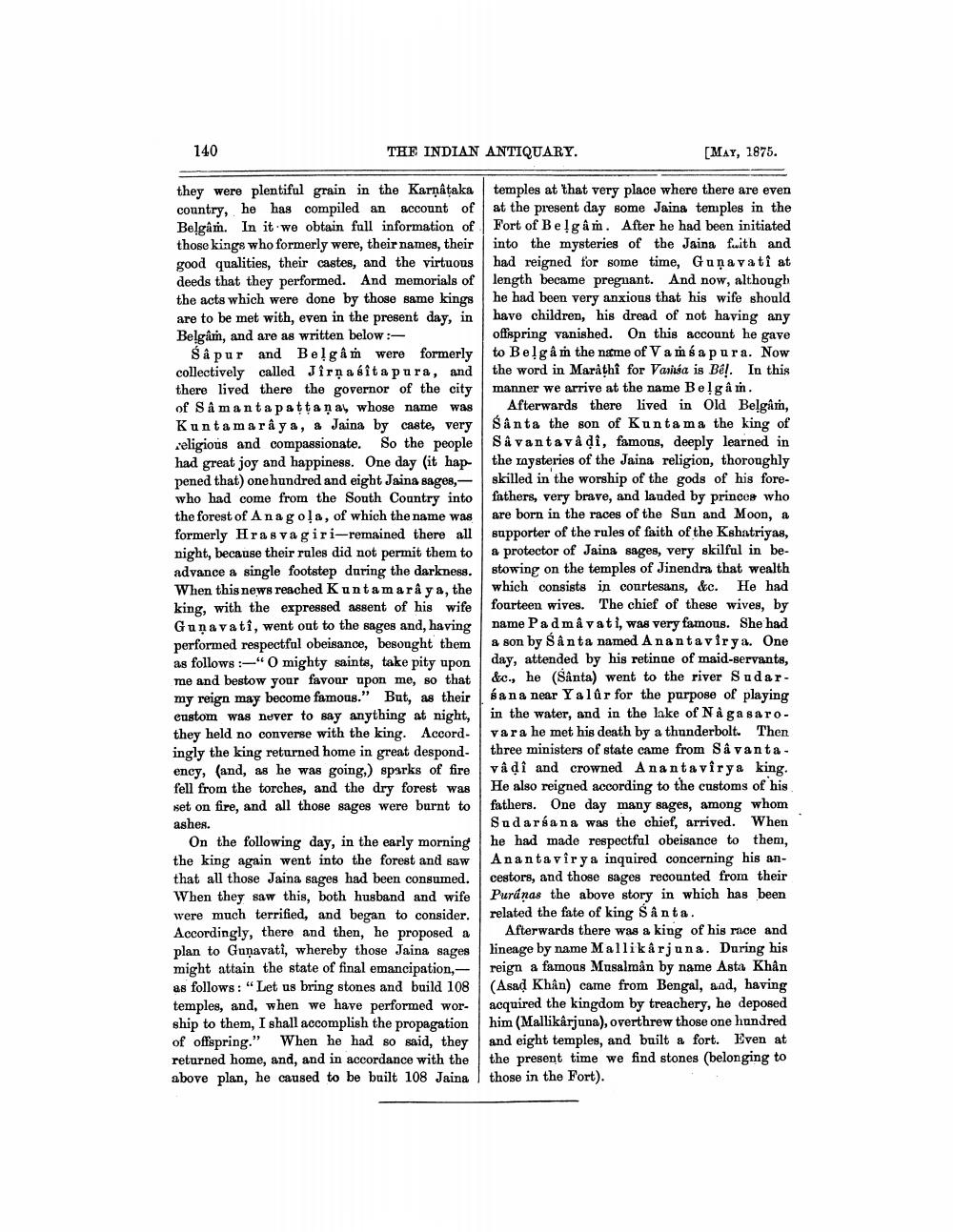________________
140
THE INDIAN ANTIQUARY.
they were plentiful grain in the Karnataka country, he has compiled an account of Belgâm. In it we obtain full information of those kings who formerly were, their names, their good qualities, their castes, and the virtuous deeds that they performed. And memorials of the acts which were done by those same kings are to be met with, even in the present day, in Belgâm, and are as written below:
Sâpur and Belgâm were formerly collectively called Jirnasîtapura, and there lived there the governor of the city of Samantapaṭṭana, whose name was Kuntamaraya, a Jaina by caste, very religious and compassionate. So the people had great joy and happiness. One day (it hap pened that) one hundred and eight Jaina sages,who had come from the South Country into the forest of A na gola, of which the name was formerly Hras vagiri-remained there all night, because their rules did not permit them to advance a single footstep during the darkness. When this news reached Kuntamarâ y a, the king, with the expressed assent of his wife Gunavati, went out to the sages and, having performed respectful obeisance, besought them as follows:-"O mighty saints, take pity upon me and bestow your favour upon me, so that my reign may become famous." But, as their custom was never to say anything at night, they held no converse with the king. Accordingly the king returned home in great despondency, (and, as he was going,) sparks of fire fell from the torches, and the dry forest was set on fire, and all those sages were burnt to ashes.
On the following day, in the early morning the king again went into the forest and saw that all those Jaina sages had been consumed. When they saw this, both husband and wife were much terrified, and began to consider. Accordingly, there and then, he proposed a plan to Gunavati, whereby those Jaina sages might attain the state of final emancipation, as follows: "Let us bring stones and build 108 temples, and, when we have performed worship to them, I shall accomplish the propagation of offspring." When he had so said, they returned home, and, and in accordance with the above plan, he caused to be built 108 Jaina
[MAY, 1875.
temples at that very place where there are even at the present day some Jaina temples in the Fort of Belgâm. After he had been initiated into the mysteries of the Jaina faith and had reigned for some time, Gunavati at length became pregnant. And now, although he had been very anxious that his wife should have children, his dread of not having any offspring vanished. On this account he gave to Belgåm the name of V a msapura. Now the word in Marathi for Vamsa is Bê!. In this manner we arrive at the name Belgâm.
Afterwards there lived in Old Belgâm, Śânta the son of Kunta ma the king of Savanta vâ di, famous, deeply learned in the raysteries of the Jaina religion, thoroughly skilled in the worship of the gods of his forefathers, very brave, and landed by princes who are born in the races of the Sun and Moon, a supporter of the rules of faith of the Kshatriyas, a protector of Jaina sages, very skilful in bestowing on the temples of Jinendra that wealth which consists in courtesans, &c. He had fourteen wives. The chief of these wives, by name Padmavati, was very famous. She had a son by Śânta named Anantavirya. One day, attended by his retinue of maid-servants, &c., he (Sânta) went to the river Sudarsana near Yalûr for the purpose of playing in the water, and in the lake of Nà gasarovara he met his death by a thunderbolt. Then three ministers of state came from Sâvantavâdî and crowned Anantavirya king. He also reigned according to the customs of his fathers. One day many sages, among whom Sudarsana was the chief, arrived. When he had made respectful obeisance to them, Anantavirya inquired concerning his ancestors, and those sages recounted from their Puranas the above story in which has been related the fate of king Śânta.
Afterwards there was a king of his race and lineage by name Mallikarjuna. During his reign a famous Musalmân by name Asta Khân (Asad Khân) came from Bengal, and, having acquired the kingdom by treachery, he deposed him (Mallikarjuna), overthrew those one hundred and eight temples, and built a fort. Even at the present time we find stones (belonging to those in the Fort).




